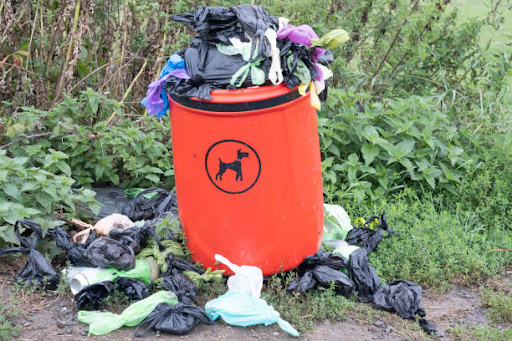When it comes to our furry companions, responsible pet ownership extends beyond love and care—it also includes proper waste management. In this blog, we will explore the importance of dog waste stations in promoting a clean and hygienic environment.
Did you know that a single gram of dog waste can contain millions of harmful bacteria and parasites? These microbes can seriously harm both human and other animals' health. By installing dog waste stations in public areas, we can prevent the spread of diseases and ensure the safety of our communities.
Aside from health concerns, dog waste also contributes to unpleasant odors and pollution. The smell can be overwhelming, and the waste can contaminate water sources, affecting the ecosystem. Dog waste stations effectively address these issues by providing a convenient and proper disposal method.
Eliminating unpleasant odors
Unpleasant odors resulting from dog waste can be a major concern for any community. They not only create a nuisance but also pose health risks. Thankfully, dog waste stations address these pinpoints by providing a practical solution for odor control. These stations are strategically placed to encourage responsible pet owners to dispose of waste properly.
Dog waste stations effectively eliminate unpleasant odors by providing designated containers for waste collection. These containers are intended to trap the smell and stop it from dispersing into the surrounding air. By using these stations, pet owners can promptly dispose of their dog's waste in a hygienic manner.
Proper waste disposal not only ensures a fresh-smelling environment but also helps maintain the overall cleanliness of public spaces. In turn, this makes the neighborhood a healthier and more pleasurable place for everyone.

Preserving natural resources
Preserving natural resources is crucial for maintaining a clean and healthy environment. When it comes to dog waste, it's essential to address the pinpoints of its impact on our water sources. Dog faeces disposal issues may contaminate rivers, lakes, and groundwater, endangering both human and animal health.
To mitigate this issue, dog waste stations play a vital role. These stations provide a convenient and hygienic method of waste disposal, preventing waste from seeping into our water systems. By encouraging pet owners to utilize these stations, we can protect our precious natural resources and ensure their sustainability for future generations.
In addition to making the environment cleaner by protecting our water resources, we also help our communities as a whole. Let's make a conscious effort to utilize dog waste stations and preserve our natural resources for a healthier and greener world.
The long-term benefits of preserving natural resources
Preserving natural resources is vital to ensure a cleaner and healthier environment for future generations. When we address the pinpoints of improper waste disposal, such as dog waste, we can understand the importance of preserving our natural resources.
By utilizing dog waste stations to dispose of pet waste, we prevent contamination of our water sources. This proactive approach brings long-term benefits. We safeguard our rivers, lakes, and groundwater from pollution, promoting the well-being of both humans and animals.
Preserving our natural resources also contributes to a sustainable ecosystem. It helps maintain a balanced and thriving environment, supporting diverse wildlife and maintaining ecological stability.
Let's embrace the long-term benefits of preserving natural resources by adopting responsible pet waste disposal practices through the use of dog waste stations. We can build a cleaner, greener future together.

Financial and Practical Considerations
When it comes to maintaining a hygienic environment, addressing the pinpoints is crucial. One aspect that often raises concerns is the financial and practical considerations of implementing dog waste stations. When we take into account the long-term advantages they provide, these worries can be allayed. Dog waste stations are cost-effective solutions that not only promote cleanliness but also prevent the spread of diseases. Their installation and maintenance are relatively simple, making them practical for any community or public space. By comparing the expenses associated with alternative waste disposal methods, it becomes clear that dog waste stations are an affordable and efficient choice. Investing in these stations ensures a cleaner and healthier environment for everyone to enjoy.
Conclusion
In conclusion, implementing dog waste stations is a crucial step towards creating a hygienic environment that addresses the pinpoints associated with pet waste. These stations play a pivotal role in preventing the spread of diseases caused by dog waste, ensuring a healthier community. Moreover, they help eliminate unpleasant odors, making public spaces more enjoyable for everyone. By promoting responsible pet ownership, these stations encourage pet owners to dispose of waste properly, reducing environmental contamination and preserving natural resources. Additionally, the financial and practical considerations make dog waste stations a cost-effective and convenient solution. Let's take action and embrace the benefits of dog waste stations for a cleaner, healthier, and more sustainable community.
Frequently Asked Questions (FAQ)
A: A dog waste station is a designated area where dog owners can dispose of their pet's waste. It usually consists of a trash can, waste bags, and a sign reminding owners to clean up after their dogs.
A: No, dog waste stations are relatively affordable, and the cost depends on the features and accessories included in the package.
A: Yes, dog waste stations are suitable for residential areas as well as commercial spaces such as parks, playgrounds, and recreational areas.
A: Yes, dog waste stations help to prevent water pollution by providing a designated area for pet waste disposal. This ensures that the waste doesn't end up in water bodies, which can cause harmful bacteria and diseases.
A: Yes, dog waste stations can help to reduce pet-related complaints by promoting responsible pet ownership and maintaining a clean and hygienic environment.


